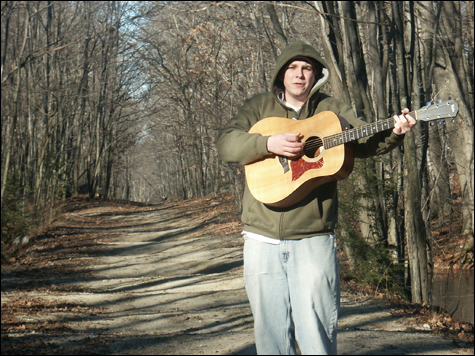
EASIN' ON DOWN THE ROAD: Jon Call. |
| The Playtime Music Session | Released by Jon Call | with Phil Daligan | at One Longfellow Square, in Portland | Feb 23 |
We’ve had the pleasure here in Portland of watching a number of great singer/songwriters develop their careers into something substantial recently. The path runs something like this: open mics with a guitar, album with a guitar, real shows with a guitar, real shows with a band, real album with a band, regional and national touring with and without a band. Jason Spooner and Emilia Dahlin come to mind immediately as the prototypes here, and now Jon Call seems poised to follow them.Right now, though, Call is floating somewhere in the middle of that trajectory, having reached the stage where he’s added to his live performance a bass and drums, known as the Foundation (which is fitting for a rhythm section), but also about to release a disc, The Playtime Music Session, that features just Call’s breathy alto (maybe he’s a high tenor) and a strummed guitar.
This isn’t entirely by design. “It was kind of supposed to be more of a demo,” Call says of the recording done with Tom Dube down in his Playtime Music Studio in Massachusetts, “but then Dube went on tour with Marc Cohn and we didn’t get together again.” Still, Call’s been getting some good gigs, including opening for Livingston Taylor on January 25 at Lewiston's Maple Room. He needed something to sell at shows, and 2006’s Change just wasn’t of the quality he wanted to represent him.
Thus, while he may eventually re-record some of these songs with a band in a studio setting, he’s relatively happy with what he calls this recording’s “live feeling.” And it’s true that when you see Call live, this is pretty much what you get. But listening at home, Call’s considerable charisma doesn’t quite come through, and what are well-written songs at times fall a little flat, or simply seem to last too long. Live, that extra minute in a song is enjoyable, because you’ve got that visual input as an augmentation of the experience. On disc, some of the tunes that move past four minutes could probably be a little more radio-friendly (i.e., closer to 3:30).
This also has something to do with Call’s particular style and delivery. He has a tendency to use “I said” as pick-up notes into a line of a verse, or in building a refrain, for example, emulating soul singers like Sam Cooke or James Brown. He bangs on his guitar, building a rhythm and a considerable backing. He likes to tip in a bit of scat for a bridge. All of these, I think, are more endearing live.
And some performers, like John Mayer or Ani DiFranco, are just better live.
There remains, however, a lot to like on Call’s sophomore disc. Especially when Call lets his hair down and opens his voice up. Early in the disc, he can be breathy, but he’s got great timbre when he gets animated, especially on later tracks like “Addiction Song” and “All I Ever Wanted.” The former opens with a bluesy strut then picks up with a low-end bass-string run that introduces each line of the verse: “You gotta be a fool to want to stay the same.” Then comes a big bridge, a declaration of intent: “I need to be free of this misery that’s loving me/’Cuz if I choose to learn I can grow — eventually.”